
AICN COMICS: Q&@ is our new semi-weekly interview column where some of your favorite @$$Holes interview comic bookdom’s biggest, brightest, newest, and oldest stars. Enjoy this latest in-depth interview filled with @$$y goodness and be sure to join the rest of your favorite @$$Holes for their opinions on the weekly pull every Wednesday with AICN COMICS REVIEWS!
@’s by PUNISHER Writer
Greg Rucka!
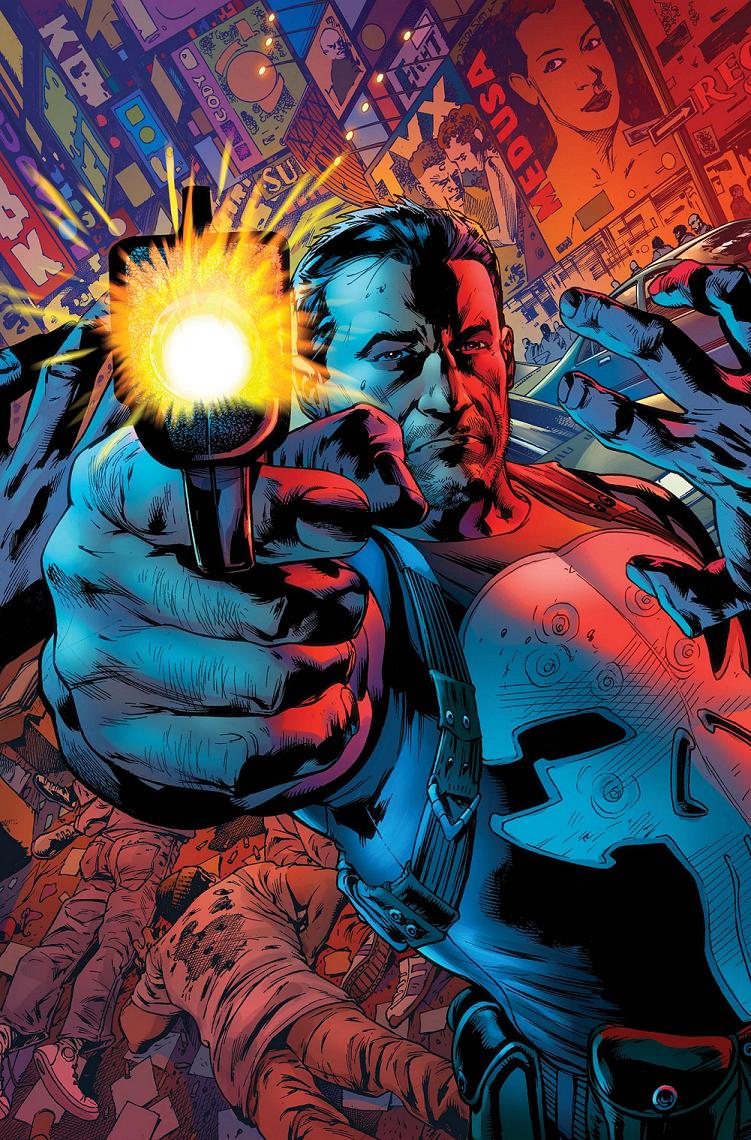 Russ Sheath here. This June the streets will run red with the blood of the Marvel Universe’s most deserving scum as writer Greg Rucka and artist Marco Checchetto take on Marvel’s singular vision of vengeance in THE PUNISHER #1. Multi Eisner and Harvey award winner Greg Rucka has lent his name to some of comics’ most enduring characters including Batman and Wolverine, as well as his own creation QUEEN & COUNTRY, for comics and novels. Most recently Greg won great acclaim as he introduced a new Batwoman to the DC Universe and his novel WHITEOUT was adapted for cinema starring Kate Bekinsdale. With a full clip and an eye for payback Greg Rucka talks to AICN’s Russ Sheath about his take on comics’ most enduring anti-hero and what he has planned for Frank Castle.
Russ Sheath here. This June the streets will run red with the blood of the Marvel Universe’s most deserving scum as writer Greg Rucka and artist Marco Checchetto take on Marvel’s singular vision of vengeance in THE PUNISHER #1. Multi Eisner and Harvey award winner Greg Rucka has lent his name to some of comics’ most enduring characters including Batman and Wolverine, as well as his own creation QUEEN & COUNTRY, for comics and novels. Most recently Greg won great acclaim as he introduced a new Batwoman to the DC Universe and his novel WHITEOUT was adapted for cinema starring Kate Bekinsdale. With a full clip and an eye for payback Greg Rucka talks to AICN’s Russ Sheath about his take on comics’ most enduring anti-hero and what he has planned for Frank Castle.RUSS SHEATH (RS): Why take on the Punisher?
Greg Rucka (GR): When (Marvel Senior Editor, Stephen) Wacker came to me and said “Punisher, in the Marvel Universe,” my first response was, “are you kidding me?”
But, you know, I like characters that are ostensibly simple in concept, but whose simplicity allows for a tremendous amount of nuance in story and interpretation. Literature is full of characters who should not work as primary protagonists, characters who honestly work better as members of a strong supporting cast. That said, there exists a class within that who defy the expectation, and Frank is definitely amongst them.
Frank is very simple. You’re never going to believe a story about where the Punisher has let go of his pain and has taken up gardening, you know? That’s never going to happen. So his stories, in the main, have to be about this one thing, his hunt to punish the wicked, as he sees it.
The flip side of it that came out as Steve worked on persuading me to take the job was that revenge stories almost always end in the inevitable destruction of the person who is seeking that revenge. The classic is “Moby Dick”, right? Ahab not only kills himself, he takes just about everyone else around him down in his search for payback. Revenge is a story you’re not supposed to survive.
And Frank absolutely defies that. He should have ended a long, long time ago. You can argue all sorts of persuasive commercial reasons why that’s not the case, why he hasn’t, but those are useless arguments to the character. Frank doesn’t know about Marvel Entertainment, those reasons simply don’t apply. So I found myself asking how it was he could survive, how he could maintain this mission for so long.
That opened up a whole lot of possibilities for me, and it really says a lot about Frank. He long ago passed revenge, he got his revenge in the most literal sense, and yet he continues, he’s still driven by that rage and that hunger. Considering the pain he was in at the start – and that he conceivably is in even now – over what happened to Maria and the kids, you have to wonder why he hasn’t just put the gun in his mouth and ended it all. You can make a pretty interesting argument as to why he hasn’t done that. You can have a lot of fun and tell some interesting stories exploring that.
So, those are some of the elements. That was part of it, what got me thinking seriously about the job. And then there’s the fact that Frank is a kind of character I really just enjoy writing. We have all these characters in comics who’ve now existed for multiple generations, have been written by so many people who’ve reinterpreted them over and over again, perhaps to the point of exhaustion. I mean, I look at Batman and I think there’s not a whole lot more you can say about him and have him still be Batman. You monkey with the formula too long you end up with something else.
Frank doesn’t need reinterpretation. Frank is beautifully established, and he’s been truly honed to a razor’s edge in the last several years by the people writing him – Garth Ennis and Jason Aaron immediately spring to mind, and there are others – they’ve all sharpened him to such a point that there isn’t a whole lot more that I can say that hasn’t already been said, and said better. Frank is so complete that he allows me to do something I really enjoy, honestly, which is to show the character through other people’s eyes – it’s what Ed and I did a lot in GOTHAM CENTRAL, to show the view from the ground. And it’s a great story to tell, I think: what happens when you’re the guy who survives an encounter with the Punisher? How does that look?
It’s a long answer, but those are some of the things that really spoke to me, really engaged me.
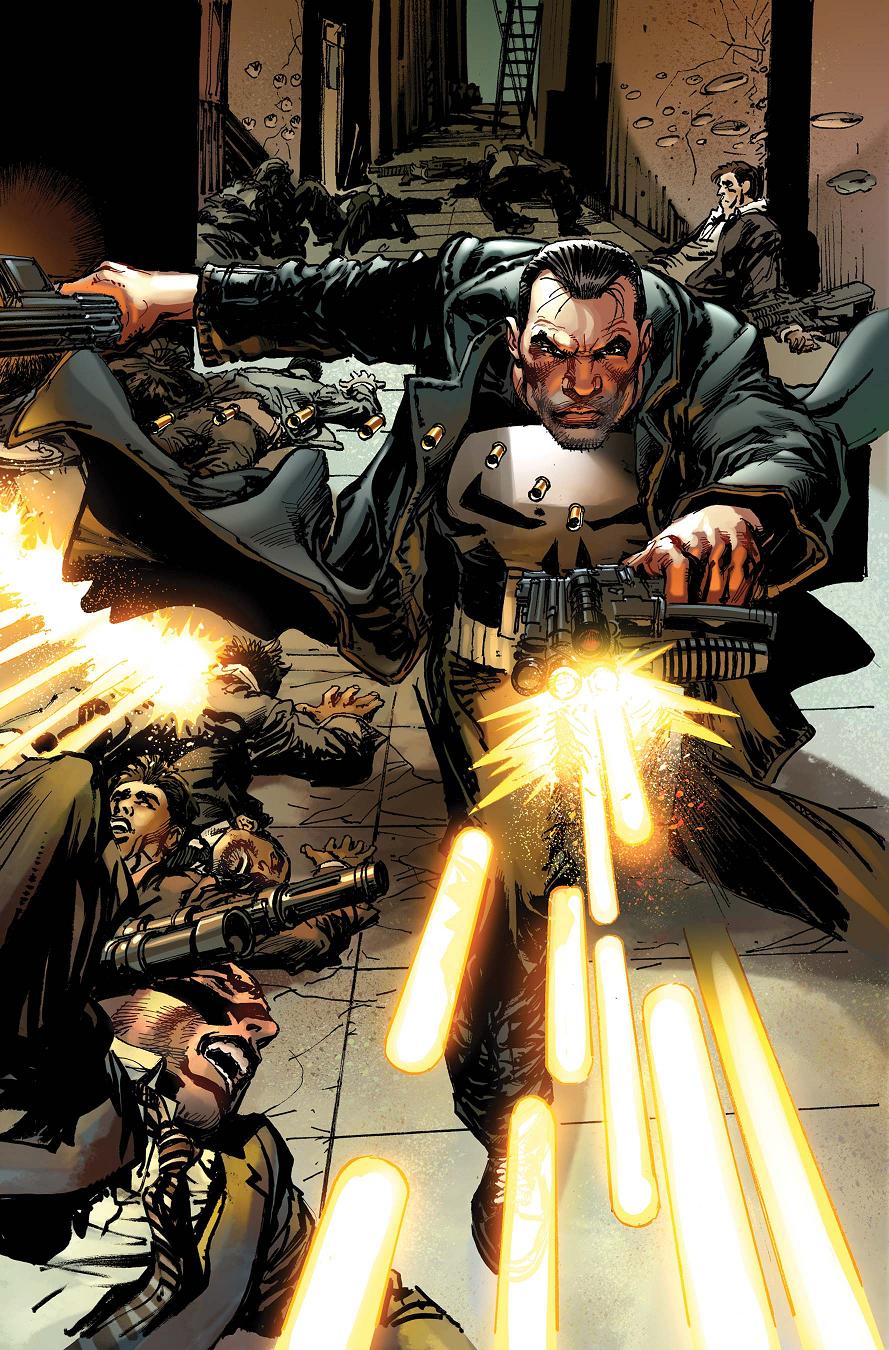 RS: Can you tell us how we find Frank when your arc starts?
RS: Can you tell us how we find Frank when your arc starts?GR: The run begins post “Fear Itself” (Marvel’s big summer cross-over event for 2011); although we never acknowledge it as such, it’s sort of referenced that an event has happened. It’s baseline Frank. No gimmicks, no tricks, nothing but Frank, a cinderblock basement, and an awful lot of precision firepower.
It’s very muted at the start. We focus on a particular tragedy that arises in the wake of “Fear Itself”, with the criminal balance in New York shifting and the inevitable birth pains of new organisations arising as a result. Essentially, we visit a wedding reception that ends up with 30 people dead. That is something that Frank is going to take notice of.
One of the things that I love in recent years with The Punisher – and it appeals to my love of military-esque stuff – is the attention to detail Frank brings to his work. There’s intel and prep and the need to identify the targets, to work smart, and I think Frank is very, very smart.
I think it was Axel (Alonso) said this recently to me, that the pleasure of a Punisher arc is in watching him go up against someone so vile that you cannot wait until Frank rips out their entrails (laughs). Another way to put that is that the Punisher needs villains the reader wants to see die.
At the same time I’m kind of intrigued by this thin line that Frank is walking. I don’t like a Punisher who’s crazy. I don’t like the idea that he does not know everything he is doing. I don’t like reducing him that much, making it simple, or giving him that excuse. It’s much more interesting to me when every bullet he fires, every life he takes, that’s a choice he’s made, it’s deliberate, it’s calculated.
RS: The assumption, given your background and the characters you have written in the past, is that you might be more suited towards the MAX (Marvel’s mature readers imprint) version of the character. Was writing the regular universe version of The Punisher a challenge?
GR: It is a challenge, but I don’t see a huge difference in those two men, if that makes sense. MAX Punisher and Marvel U Punisher are both born of the same tragedy. They both pursue the same agenda, the same mission. What happens in the Marvel U is that you have to be more conscientious about portraying the evil he is fighting, and about the violence you are showing on the page.
Marco (Checchetto) is wonderfully talented a story teller. I honestly feel that some of the stuff we see on the page is as intense, as emotionally and viscerally forceful, as some of the stuff we’ve seen in Max. In Max, I can show what happens when Frank shoots someone in the head, gore and all. In Marvel U, I show Frank firing and leave the rest up to you. That’s not a detriment, in my view.
RS: I think the danger of the MAX books is in them becoming 22 pages of inventive ways to kill somebody.
GR: I absolutely agree with that. At a certain point, you run the risk of it becoming torture porn. I’m not interested in that.
You know, Frank does not speak in the first three issues, he doesn’t open his mouth, there’s no first person narration, there’s no War Journal. He is absolutely and utterly moving through the world in a cone of silence and that’s deliberate, not because it would be cool if he doesn’t say anything, but that’s who he is. That’s how he has to live. He’s divorced himself.
Marco quoted the re-cap text I wrote for the first issue, ’Frank Castle died with his family. Now he is simply The Punisher.’ He’s a dead man walking, and he knows it. One of the things I’m looking forward to as we go further into the series is what that means to him and to the people he encounters.
He’s always on mission. When he’s sleeping he’s on mission. “I’m resting the weapon so it will be ready,” and eventually he will be opposite somebody who’s going to start challenging him. At that point, he’ll talk because he’ll have something to say.
He is so unique. I’m just fascinated by that, how he walks this line that so few other characters have successfully navigated.
RS: Will we see any new characters in your run?
GR: Oh, hell yes. There are two detectives who appear early on, and we’ll follow them quite a lot. One of them is a really good, smart cop, very Holmes-like. His partner is kinda messed up, has a back-story with Frank that we learn about in the back-up to Issue 1. There are a couple others who will end up playing substantial roles, as well. And I’m using Norah Winters, who is awesome to write, if a bit daunting.
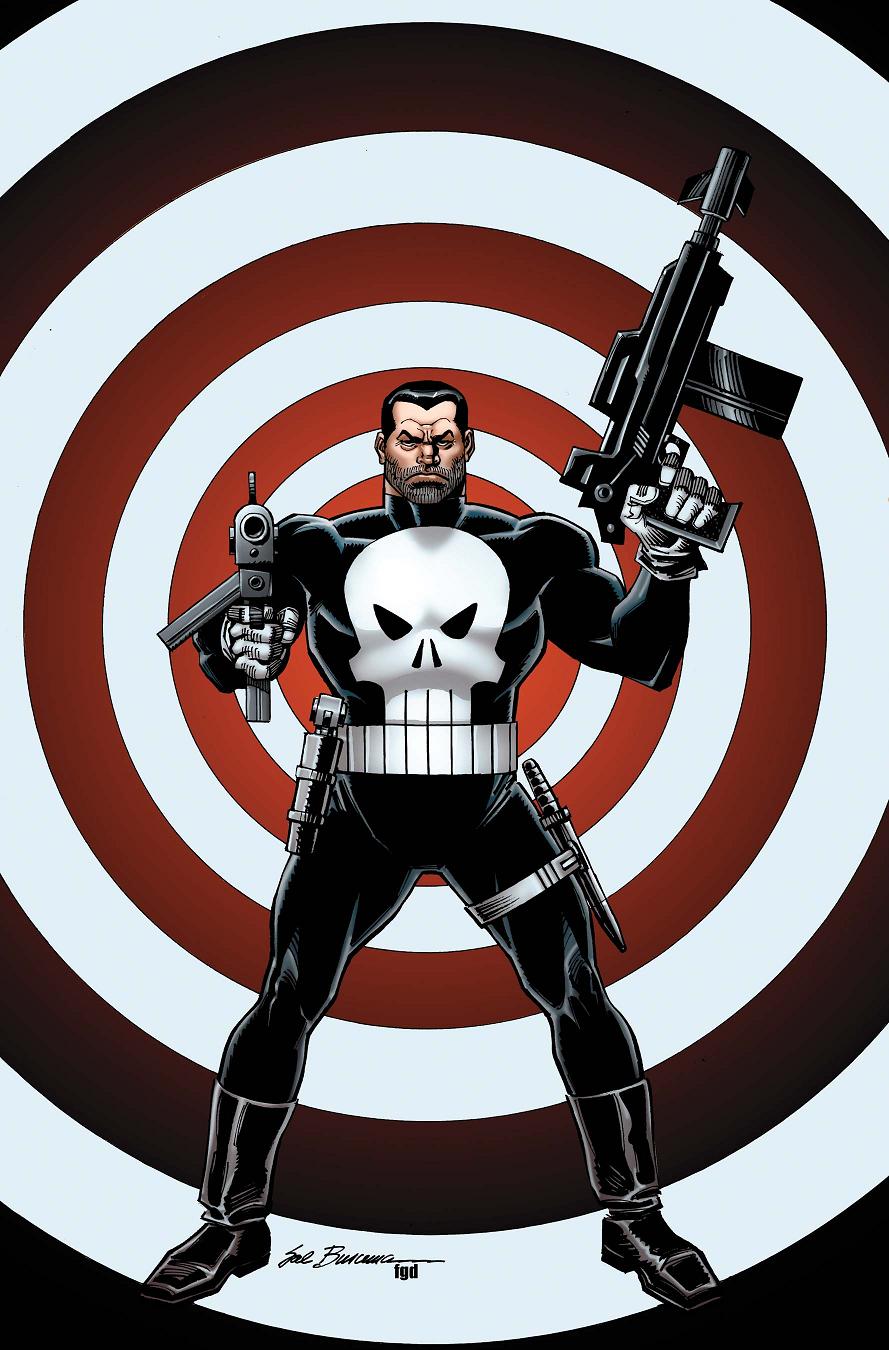 We’re introducing at least one new criminal organisation, too, The Exchange. Essentially a couple of henchmen from other organizations who had a brainwave and realized that they could effectively take over all street-level crime with what they know, what they can do. The average street crew wouldn’t stand a chance in the face of that. They’re all business, they’ve traded their costumes for Armanis, and they’re very smart. They know The Punisher is going to be more of a problem for them than Thor, for instance, so they plan for that.
We’re introducing at least one new criminal organisation, too, The Exchange. Essentially a couple of henchmen from other organizations who had a brainwave and realized that they could effectively take over all street-level crime with what they know, what they can do. The average street crew wouldn’t stand a chance in the face of that. They’re all business, they’ve traded their costumes for Armanis, and they’re very smart. They know The Punisher is going to be more of a problem for them than Thor, for instance, so they plan for that.RS: Are there any other guest appearances coming up?
GR: Steve and I have talked about ones that inevitably have to happen. There has to be a Punisher/Daredevil, that’s classic. We talked this week about a short little Punisher/Spider-Man idea that might play into what he’s doing in those books.
And I have some ideas about how it might play if our Mighty Marvel Heroes decide they have to shut Frank Castle down. There’s a scene I would love to write with Frank and Logan that would be terrific fun if I can ever justify getting to it. Frank doesn’t have powers but what he has is a lot of training, a lot of experience, and a lot of smarts. And he plans. If the Avengers went after him, you know, of course they would win. But they might end up with a few more bloody noses than they’d expected.
I love the idea of putting him and Captain America together, too. If there’s anybody in the Marvel Universe who’s going to get Frank to stand still and listen, it’s going to be Captain America. In many senses Frank is out of control, by which I mean the only control over him is his own. You cannot cage him. What’re you going to do? Arrest him? We’ve seen what happens when you put him in prison – it’s like telling a kid you’re punishing him by sending him to the playground. It just doesn’t work.
You can’t really stop him, and you’re certainly not going to make him feel bad about what he’s doing. But he’s a Marine, and if Captain America stands in front of him and says, ‘stop that now’ there’s a good chance Frank’s going to listen. That creates a real interesting field of possibilities.
RS: To me the default setting is, when making a character dangerous, to make them ex-special forces. When you look across the Marvel Universe there aren’t many characters like that, with that understanding of tactics, training and the like.
GR: A lot of them haven’t needed it. Spider-Man. Why does Peter need to know how to spot an ambush, how to break one, if he’s got spider-sense to do it for him? Why does Daredevil need it when, with a half second’s effort, he knows the position of everybody around him and can anticipate everything they’re going to do?
I honestly think that most of the Marvel heroes haven’t considered the fact that Frank has likely spent weeks upon weeks upon weeks thinking about what he would do if this situation came to pass with them, if that thing happened. I don’t think they credit him with that kind of planning. They’d credit Reed with that kind of planning, not Frank.
That’s not a flaw, per se. Frank’s been very successful with the head on approach, after all. But that doesn’t mean he’s not capable of being very, very crafty, and very sneaky, and there are times when you are never going to see him coming. He’s a soldier. He doesn’t really care whether the fight is fair or not. He cares whether or not he’ll win. And he’s not looking for fights he can’t win, because that’s not what soldiers do.
RS: The Punisher’s look has remained fairly stable, but there has been the trench coat, the t-shirt skull, the spandex with a bold white skull outfit. Which look are you going for?
GR: When Marco and I first started trading emails we both had a very similar visual lexicon that we were sharing without really knowing it. Marco talked a lot about the John McClane, DIE HARD, feel - the idea that he is a man of flesh and blood, there is sweat and blood and meat and bone. He isn’t invincible. There’s a strong Daniel Craig as Bond influence that Marco’s playing from, as well, and that very much works for me.
We decided early on that the skull isn’t a shirt, but rather something painted onto his body armour. I like the idea that everything he is using is hands on – he’s not silk-screening skull shirts or picking them up at Hot Topic. If there’s a skull on something, he’s put it there himself. That might be the only vanity he has in his life, and he’d argue that it’s not vanity, it’s a tactical decision designed to install fear into the target.
And If I was arguing with him (and was drunk enough to argue with him) I’d say, ‘bullshit! You know as well as I do that you don’t want them to be scared, you want them to be dead!’ Keeping the body armour matte black would be a better aide to that, but you’re not doing that, you made that choice, so you’re making a statement, there, Frank.
RS: I think that with Frank, when you see him with modern weapons it takes the reader away from the character. When you think of where Frank gets his weapons from, the chances are he takes them from the people he kills.
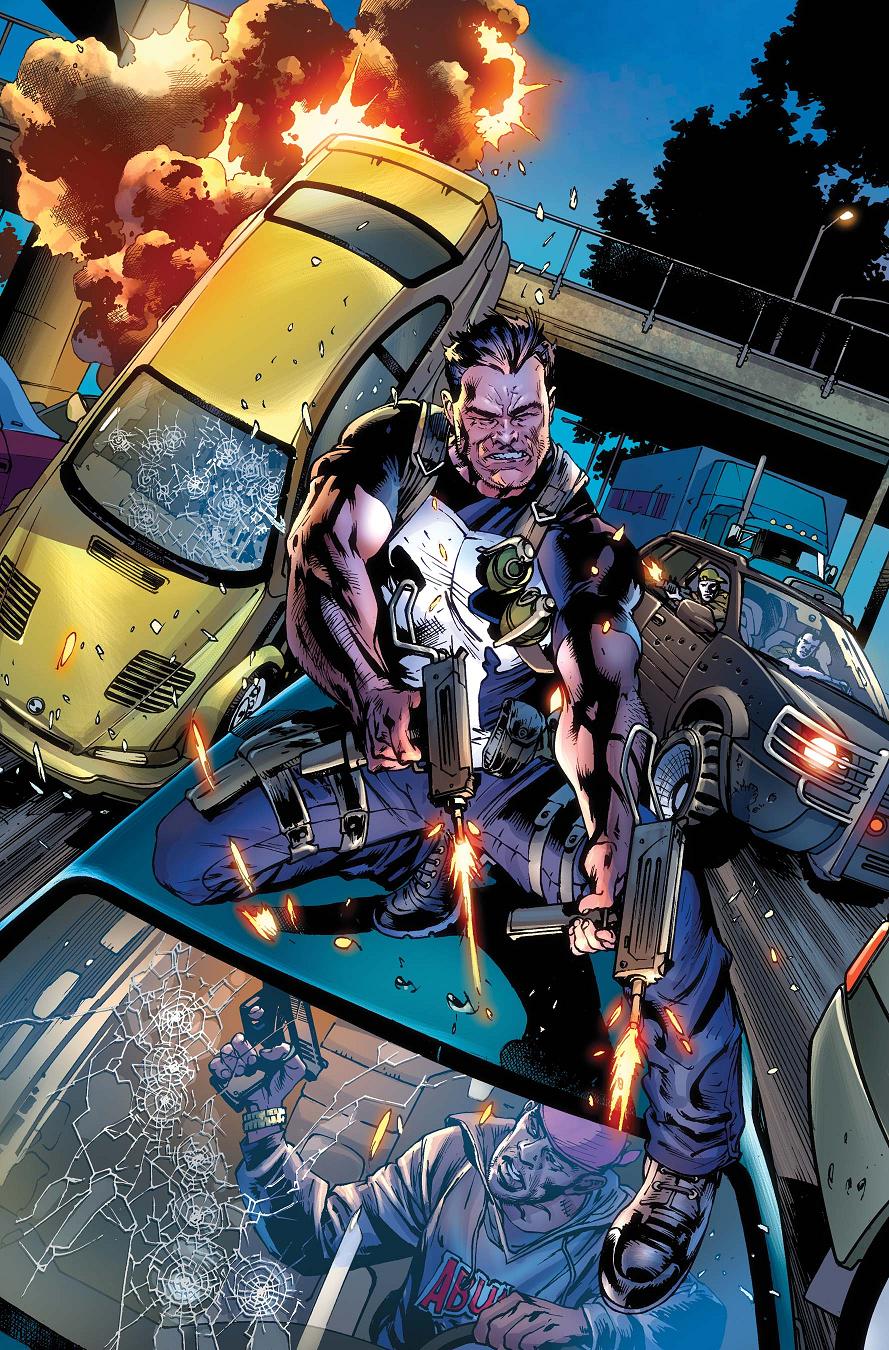 GR: I agree with that. The first issue, our detectives end up going after a guy selling guns, and of course Frank’s already been there, and the van is emptied out. He’s going to “repurpose the material.”
GR: I agree with that. The first issue, our detectives end up going after a guy selling guns, and of course Frank’s already been there, and the van is emptied out. He’s going to “repurpose the material.”There are some items in the Marvel Universe, and I don’t want to give too much away, but if Frank Castle had an ounce of them…the havoc he could create. Seriously. If he were to get hold of a very small amount of a very particular alloy, he could make life very, very hard for a lot of people.
RS: One might argue there are common themes between the characters you have written in the past. What’s the appeal of that kind of character?
GR: I keep coming back to nature versus nurture issues. It’s what I did with Elektra, and if I had taken that run to the end I had in mind, it would’ve been very apparent. Does she do what she does because she wants to or because she can’t not?
Frank is a great nature vs. nurture question. If his family hadn’t been taken from him, would he still be doing this? Garth certainly has implied that yes, he would. I don’t know. I certainly think that he cannot, at this point, turn away from what he’s become.
I guess I’m just drawn to stories where we see the price paid for the bad-assery of characters. (laughs)
Chace (Tara Chace, the main character in Rucka’s award winning QUEEN & COUNTRY comics and novels about a female MI6 agent) is a car wreck of a human being, but boy you do not want to face off against her because she will come at you like a tiger. She will fight literally until the last drop of blood.
It is a recurring theme in my work, I don’t know why. I haven’t found any answer to these questions that satisfies me.
RS: Frank has his origins very specifically in the Vietnam War; does this pose any storytelling issues when you are dealing with a character who in reality should be in his late 60’s?
GR: Yeah, absolutely, but then again, I’ve got no intent of retelling his origin, simply because I don’t think anyone needs to have it retold to them. By the same token, I don’t intend to dwell on the fact that, if he’s a Vietnam vet, he really shouldn’t be in any condition to do what he’s doing. He needs to be of ‘an’ age, but that age for my purposes can be ill-defined.
If I were revising Frank now – and I am not - the story could just as easily be that he comes home from Afghanistan or Iraq, and what happens following that. You could change references from the jungle to the sand and I think you would still have Frank.
RS: What in your mind makes a compelling Punisher story?
GR: Two things, I think. As I said before, I think that putting him opposite adversaries who you want to see him absolutely and utterly destroy but who don’t make it easy for him to do that, that’s crucial. That’s what defines him. That’s simple; it’s Writing 101.
The second, and this has to be done quite sparingly, are the stories where we get to see him having, perhaps, the chance to turn away, to change, and the inevitability of him refusing that, either because he won’t, or because he believes he can’t.
RS: Many characters have had many defining moments for a writer to draw upon; however, with Frank he has had one singular defining moment, but less ‘milestones’ throughout his history. Is there a desire for you as a creator to give Frank some milestone moments?
GR: Not really, but then I never approach work like that. I think it’s kinda gimmicky. Look, Frank is not going to change. He can’t. He changes, you’ve broken him. Those milestone moments that you’re talking about, those are moments of perceived character change. Even if the character never really does change, it’s smoke and mirrors, trying to make the reader think you’ve done something you haven’t. You’re not going to believe me if I give you a story where Frank falls in love. Who’s going to believe that? It’s just not in his character. And even if I tried to sell you that bill of goods, you already know how that story has to end – she’s going to die and he’s going to go back to cutting a bloody swath through the world.
I think the milestones for him are milestones of the journey. Who accompanies him, who endures, who does not? Who makes it through, who doesn’t? Those, perhaps, are worthy of remarking. And to a great extent, that’s what Marco and I are doing, looking at the people who get caught in his wake, what it does to them, and what – if anything – it does to Frank.
RS: Frank’s a military man. To me that’s the core of the character, who he is and how he does what he does. How much of Frank’s military past is evident in your upcoming run?
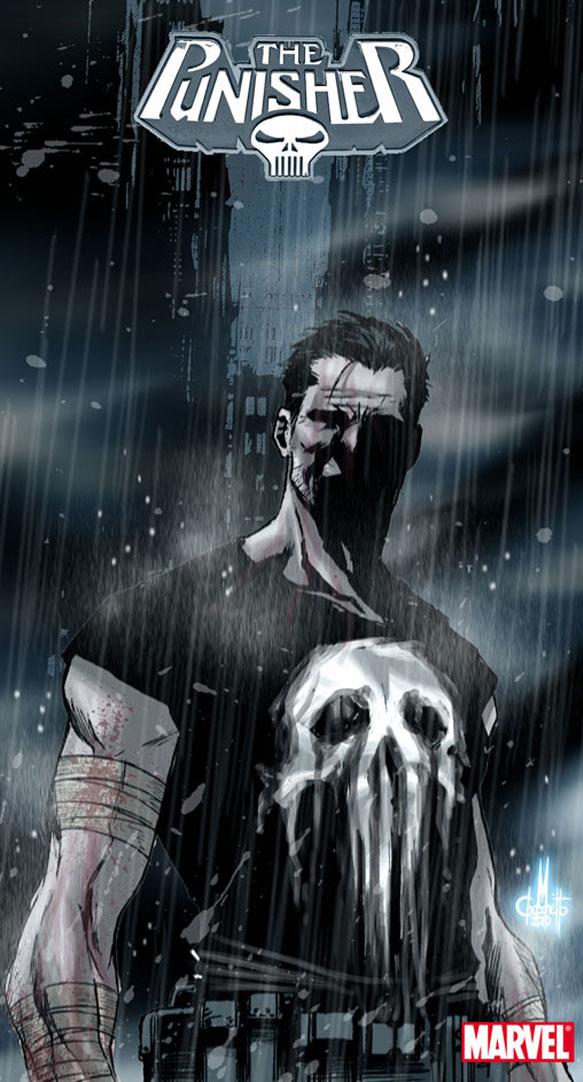 GR: Everything he does is informed by that. I’ve used the phrase a couple of times already, but he’s always ‘on mission’.
GR: Everything he does is informed by that. I’ve used the phrase a couple of times already, but he’s always ‘on mission’.That’s not a civilian term. I’d have him eat MRE’s if I thought that was a reasonable use of a page, you know? I’ve actually specified in the script, no silly gun use. I don’t like him walking casually into a gun fight. I see the appeal of him just standing there, bullets magically missing him, but…that’s got to be used sparingly, and that’s a subjective thing, to me – that’s through someone else’s eyes, what they think happened. But Frank is smart, he’s soldier smart, soldier trained, he knows you don’t stand up in the middle of a crossfire. When he raises his weapon, when he’s shooting, it’s proper stance, two hands on the weapon. There’s a beat in issue 2 that breaks that, but it’s a very deliberate choice. Lots of double-taps.I was watching the first episode of the Moffat and Gatiss ‘Sherlock’ for like the third or the fourth time because I’m a huge Holmes fan. There’s that wonderful moment very early on where Watson is sitting opposite his therapist and she says ‘John, you’re a soldier and now you have to adjust to civilian life and keeping a daily blog of the things that happen to you will help you in that transition’.
And Watson says, ‘Nothing ever happens to me’.
There’s so much eloquence in that. The soldier – especially the combat soldier – emerges from an environment of intense emotion, intense physicality, intense pressure, intense camaraderie, and then they’re jettisoned back into this amorphousness that is our society… the rigidity is gone, structure is gone, support is gone. Time means a totally different thing between civilian life and military life.
There is something to be played with there, and I don’t think Frank ever truly left service, in a sense. He never left combat. He’s going to be interacting with other military-based characters, characters in somewhat similar circumstances, and it’ll be interesting to watch how that goes.
RS: Frank’s a fairly simple guy in his motivations and goals. Does that make him a tough character to write in that he is so single minded?
GR: It’s the opposite. Simple isn’t a bad word, you know? And in Frank’s case, it’s incredibly eloquent. His simplicity allows for so much depth and nuance. I love the fact that you know what you are getting when you pick up the book. There is a reasonable expectation on the reader’s part that they are going to get to see Frank deliver ass-kicking vengeance on people who really should not be suffered to breathe.
It’s interesting to me, one of the things that we get in comics is that the new writer tends to come in and throw out everything that the guy or gal who came before did. It leads to needing to reinvent the wheel. I’ve been guilty of it, and I regret doing it, honestly. If you decide ‘I’ve got a whole new take,’ implicit in that is that the guy who came before you, their take wasn’t that good.
But with Frank, you just…you do not have to do that with him, you can’t really even justify doing it. He simply never veers that far from the core elements of his character, and you can return to that time and again without indicating any disrespect to those who have come before. That’s not the case with a slew of other characters.
RS: Are you a fan of the ‘War Journal’ approach to Frank?
GR: I think that when it’s done well it’s fantastic. I’m not using it simply because I don’t want to be in his head, for two reasons, really.
The first is that I don’t think we need it for the story Marco and I are trying to tell. When you are in somebody’s head you know why they are doing what they are doing. I want the reader to be in the observer position along with these other characters, not necessarily to understand what Frank’s motivation is from moment to moment.
The basic motivation never changes, anyway. The basic motivation is “my wife and kids were murdered and you are all going to fucking pay!” That’s never going to change. If I was writing his thought process, it would be room clearance stuff. It would be “enter, turn to right, fire one fire two tango down shift high left fire three fire four….”
You do that once, it’s interesting. You do it twice, it’s boring.
It goes back to the simplicity. There’s something he does at the end of the first issue that some readers, I’m sure, will think is way out of character. But I don’t think it is. It’s entirely on mission.
RS: Imagine a situation where your editors come to you tomorrow and tell you that Disney have decided Marvel are only going to publish Mickey Mouse comics. You are going to write the last Punisher story, ever! How does it end for Frank?
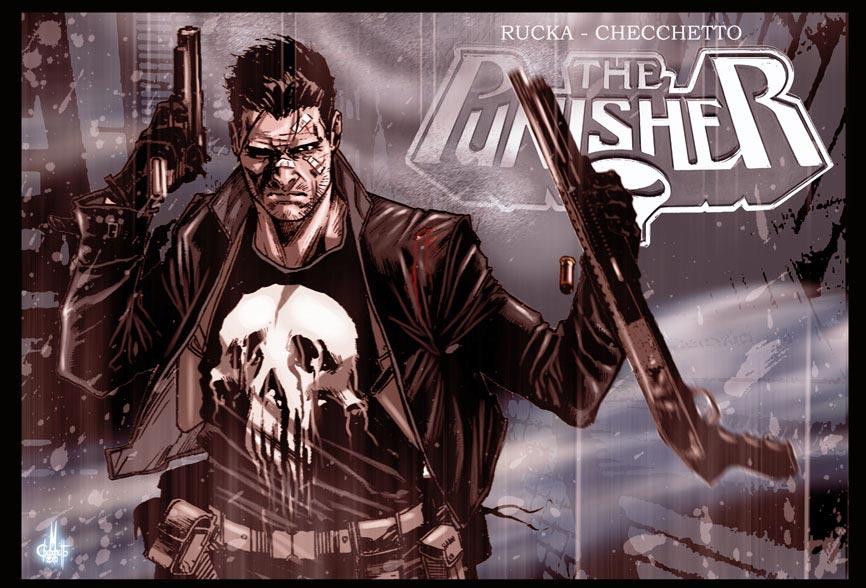 GR: He identifies the largest number of adversarial threats and basically sends them a letter saying’ I will be here at this location and at this time, come kill me’. They arrive and he napalms the whole place and goes up with them.
GR: He identifies the largest number of adversarial threats and basically sends them a letter saying’ I will be here at this location and at this time, come kill me’. They arrive and he napalms the whole place and goes up with them.RS: So, it’s not going to be a happy ending?
GR: Oh, God, no. I wonder if he even believes in God anymore, but if he does, he’s certainly going to Hell. On some level, I think he wants to believe, because he wants to believe that his wife and kids have gone to heaven.
Talk about a crisis of faith: how can you believe in god if you’re the Punisher?
There’s a whole different discussion here, you know. Where we can talk about what we ask of soldiers, what we do to turn them into men and women who will do what we require for the greater society. We fundamentally break people when we make them soldiers, in a way, in the same way firefighters are trained to do something totally un-natural. You don’t run into a burning building. Everything you have ever learnt for thousands upon thousands of years of evolution says ‘don’t go in there.’ Yet, we have a training regimen that breaks that, that says, ‘go in there’.
You take a soldier from a ‘civilised’ society and now ask them to quickly and efficiently and expertly take the lives of others. I do that, I’m taking more than just innocence. I am making different people, and guess what we’re back to? We’re talking about nature versus nurture again.
The worst thing that could happen to Frank Castle would be a stroke. A triple CVA that takes out his motor skills. That would be the definitive proof that God does not exist to him, to end like that.
Frank knows exactly what he’s doing, at every turn. Every justification that Frank might have had in saying, these people need to die because of what they did to me, that’s long gone. The death of his family is always present, it’s active and I think he stokes it, it’s the fuel that keeps him on mission, but, as we’ve discussed, he’s taken that revenge.
I don’t like a Punisher who’s crazy and I don’t like a Punisher who’s dissociative. He’s not on autopilot, ever. Emotionally he has deadened himself, he’s died with his family, and the body goes on. The body remains, and is used for this one purpose, this mission.
How does Frank end? What’s the line from BUTCH CASSIDY AND THE SUNDANCE KID? “He’ll end bloody.”
RS: Thank you, Greg, for the interview. Look for Greg Rucka’s THE PUNISHER coming to stores this summer from Marvel!
Proofs, co-edits & common sense provided by Sleazy G
